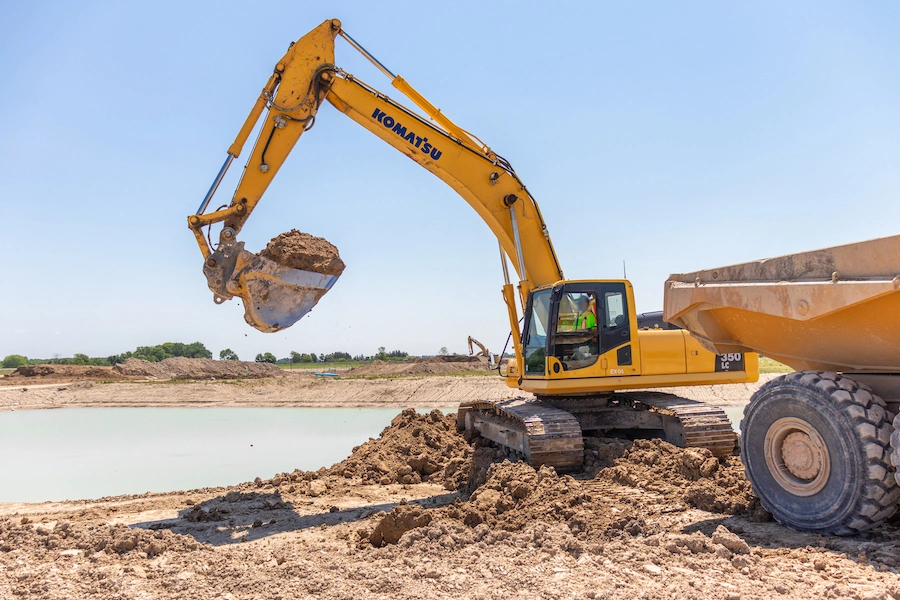The Essential Guide to Excavator Machines: Versatility and Power in Construction
Excavator machines are the backbone of the construction industry, providing the power and versatility needed to perform a wide range of tasks efficiently. From digging and trenching to lifting and demolition, excavators are essential for both small-scale projects and large infrastructure developments. Understanding the capabilities and applications of these machines is crucial for any construction business looking to optimize operations and achieve successful outcomes.
At Wigmore Trading, we supply high-quality excavator machines tailored to meet the demands of various construction projects. In this article, we’ll explore the key features, types, and benefits of excavator machines, and how they can enhance your construction operations.
What is an Excavator Machine?
An excavator machine is a heavy-duty piece of construction equipment designed for digging, lifting, and moving large amounts of material. Typically, an excavator consists of a rotating platform, a large arm (also known as a boom and stick), and a bucket or other attachment. The machine is operated by a driver who controls the arm and bucket to perform various tasks such as excavation, trenching, lifting, and demolition.
Key Components of an Excavator:
- Cab: The operator’s cabin, which provides controls and visibility for the machine’s operation.
- Boom and Stick: The long, extendable arm of the excavator, which provides reach and flexibility in handling different tasks.
- Bucket: The primary attachment used for digging and moving earth, rocks, and other materials.
- Tracks or Wheels: Excavators can be equipped with either tracks or wheels, depending on the terrain and application.
Types of Excavator Machines
Excavators come in various types and sizes, each designed for specific tasks and environments. Some of the most common types include:
1. Crawler Excavators
Crawler excavators are equipped with tracks, providing excellent stability and traction on uneven or rough terrain. They are ideal for heavy-duty digging, trenching, and earthmoving tasks, making them a popular choice for large construction projects.
2. Wheeled Excavators
Wheeled excavators are mounted on rubber tires, making them more maneuverable and faster on paved surfaces compared to crawler excavators. They are suitable for urban construction sites, road maintenance, and other projects that require mobility and speed.
3. Mini Excavators
Mini excavators are compact machines designed for small-scale projects, such as landscaping, residential construction, and utility work. Despite their smaller size, mini excavators offer impressive power and precision, making them ideal for tight spaces and delicate tasks.
4. Long Reach Excavators
Long reach excavators are designed with an extended boom and stick, allowing them to reach further than standard excavators. They are commonly used for dredging, deep excavation, and projects that require access to hard-to-reach areas.
5. Hydraulic Excavators
Hydraulic excavators use hydraulic fluid to power their movements, providing smooth and precise control over the arm and bucket. These machines are highly versatile and can be equipped with various attachments, such as breakers, grapples, and augers, to perform a wide range of tasks.
Applications of Excavator Machines
Excavator machines are used in a variety of construction and industrial applications, including:
1. Earthmoving and Excavation
Excavators are primarily used for digging and moving large amounts of earth, rocks, and debris. This makes them essential for tasks such as site preparation, foundation digging, trenching, and landscaping.
2. Demolition
Equipped with specialized attachments, excavators can efficiently demolish structures, break concrete, and clear debris. Their power and reach make them ideal for tearing down buildings, bridges, and other large structures.
3. Material Handling
Excavators are often used to lift and move heavy materials, such as steel beams, pipes, and construction debris. With the right attachments, they can handle a wide range of materials, making them versatile tools for various construction tasks.
4. Road Construction
In road construction, excavators are used for tasks such as digging trenches for utilities, grading surfaces, and removing old pavement. Their ability to work in various terrains and conditions makes them indispensable for infrastructure projects.
5. Dredging and Waterway Maintenance
Long reach excavators are commonly used in dredging operations, where they remove sediment and debris from rivers, canals, and harbors. Their extended reach allows them to access deep and hard-to-reach areas, making them ideal for maintaining waterways and preventing flooding.
Benefits of Using Excavator Machines
The use of excavator machines offers several benefits that enhance construction efficiency and productivity:
1. Versatility
Excavators are versatile machines that can be used for a wide range of tasks, from digging and lifting to demolition and material handling. With various attachments available, they can be adapted to meet the specific needs of any project.
2. Efficiency
Excavators are designed for maximum efficiency, allowing operators to complete tasks quickly and with precision. Their powerful engines and advanced hydraulic systems enable them to handle large loads and challenging terrains with ease.
3. Cost-Effectiveness
While excavators represent a significant investment, their versatility and efficiency make them cost-effective in the long run. They reduce the need for multiple machines on a job site, saving time, labor, and operational costs.
4. Safety
Excavators are equipped with safety features such as reinforced cabs, visibility enhancements, and automatic shutdown systems, ensuring the safety of operators and other workers on the job site.
How Wigmore Trading Can Support Your Excavator Needs
At Wigmore Trading, we understand the critical role that excavator machines play in the construction industry. We offer a wide range of high-quality excavators tailored to meet the demands of various projects. Whether you need a crawler excavator for heavy-duty earthmoving or a mini excavator for tight spaces, we have the right machine for your needs.
Our Services:
- Equipment Sourcing: We provide access to a diverse selection of excavator machines from leading manufacturers, ensuring that you get the best equipment for your project.
- Maintenance and Support: Our team offers maintenance and support services to keep your excavators running smoothly and efficiently throughout the project lifecycle.
- Expert Advice: We provide expert advice on selecting the right excavator for your specific needs, ensuring that you maximize productivity and efficiency on the job site.
Conclusion
Excavator machines are essential tools in the construction industry, offering the power, versatility, and efficiency needed to complete a wide range of tasks. Whether you’re working on a large infrastructure project or a small residential job, the right excavator can make all the difference in achieving successful outcomes.
At Wigmore Trading, we are committed to providing high-quality excavator machines and expert support to help you meet your construction goals. Whether you’re looking to purchase or rent an excavator, we have the solutions you need to get the job done.
Get in touch:
Ready to enhance your construction operations with the right excavator machine? Get in touch with Wigmore Trading today to explore our range of excavators and learn how we can support your project needs. Contact us via our website, email, or phone, and let’s work together to achieve your construction goals.








Comments are closed.